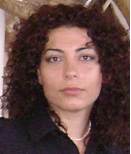Διδάκτορες
- Λεπτομέρειες
- Εμφανίσεις: 5188
|
|
Ιωάννης ΘάνοςΟ Δρ. Ιωάννης Θάνος σπούδασε Οργάνωση και Διοίκηση Επιχειρήσεων στο Οικονομικό Πανεπιστήμιο Αθηνών και έλαβε το πτυχίο του τον Ιούνιο του 2005. Είναι κάτοχος μεταπτυχιακού διπλώματος (Msc in Marketing and Strategy) από το Warwick Business School, όπου η διπλωματική του εργασία με θέμα τις Εξαγορές και Συγχωνεύσεις βαθμολογήθηκε με άριστα. Τον Νοέμβριο του 2011έλαβε το διδακτορικό του δίπλωμα από το τμήμα Οργάνωσης και Διοίκησης Επιχειρήσεων του Οικονομικού Πανεπιστημίου Αθηνών. |
 |
Αντωνία ΛαμπάκηΗ Αντωνία Λαμπάκη είναι υποψήφια διδάκτωρ στο Οικονομικό Πανεπιστήμιο Αθηνών. Κατέχει MBA με ειδίκευση στο Total Quality Management από το Πανεπιστήμιο Πειραιώς και πτυχίο στην Οργάνωση και Διοίκηση Επιχειρήσεων από το Πανεπιστήμιο Πειραιώς. Τα ερευνητικά της ενδιαφέροντα εστιάζουν στο χώρο της Στρατηγικής των Επιχειρήσεων και συγκεκριμένα στην επιλογή της κατάλληλης μεθόδου για την υλοποίηση στρατηγικών αποφάσεων ανάλογα με τις συνθήκες που επικρατούν στο εξωτερικό και εσωτερικό περιβάλλον της επιχείρησης. Άρθρα της έχουν παρουσιαστεί σε διεθνή συνέδρια: όπως το Strategic Management Society, το European Academy of Management, το International Congress of Applied Psychology. Έχει εργαστεί για περισσότερο από 5 χρόνια στη PricewaterhouseCoopers (PwC) ως Senior Consultant στο τμήμα Διαχείρισης Κινδύνου και έχει πραγματοποιήσει πληθώρα σεμιναρίων εκπαίδευσης στα στελέχη της εταιρείας για τον έλεγχο και τη συμμόρφωση με τις πολιτικές της εταιρείας. Είναι μέλος του Academy of Management, του Strategic Management Society, και του Οικονομικού Επιμελητηρίου Ελλάδος (ΟΕΕ). |
|
|
Μαρία-Νίκη ΛυριωτάκηΗ Μαρία-Νίκη Λυριωτάκη σπούδασε Οργάνωση και Διοίκηση Επιχειρήσεων στο Οικονομικό Πανεπιστήμιο Αθηνών και έλαβε το πτυχίο της τον Ιούνιο του 2001. Έλαβε το μεταπτυχιακό της δίπλωμα στην Οικονομική Επιστήμη από το Οικονομικό Πανεπιστήμιο Αθηνών, όπου η διπλωματική της εργασία με θέμα την επένδυση σε αποθέματα των πολυεθνικών επιχειρήσεων δημοσιεύτηκε στο έγκριτο περιοδικό International Journal of Production Economics. Τον Νοέμβριο του 2009 έλαβε το διδακτορικό της με θέμα “Λήψη και Υλοποίηση Στρατηγικών Αποφάσεων: Μια Πολυδιάστατη Ανάλυση των Σχέσεων μεταξύ Ευρύτερου Πλαισίου, Διαδικασίας και Αποτελεσμάτων”. Τα ερευνητικά της ενδιαφέροντα εστιάζουν στο χώρο της στρατηγικής των επιχειρήσεων, της λήψης και υλοποίησης αποφάσεων. |
|
|
Ιωάννης ΧριστοδούλουΟ Ιωάννης Χριστοδούλου σπούδασε Μάρκετινγκ και Επιχειρησιακή Έρευνα στο Οικονομικό Πανεπιστήμιο Αθηνών και έλαβε το πτυχίο του το 2001 αποκτώντας δύο ετήσιες υποτροφίες από το ΙΚΥ. Ολοκλήρωσε το μεταπτυχιακό του δίπλωμα στο ίδιο πανεπιστήμιο αποκτώντας το Διατμηματικό Full-Time MBA, όπου η διπλωματική του εργασία με θέμα τον ρόλο των Μεσαίων Διοικητικών Στελεχών βαθμολογήθηκε με άριστα. Το τελευταίο εξάμηνο σπουδών του έλαβε χώρα στο Οικ. Παν. της Βουδαπέστης με μέσο όρο μαθημάτων 9,5/10. Τον Ιανουαριο του 2011 έλαβε το διδακτορικό του με θέμα “Ο Ρόλος των Μεσαίων Διοικητικών Στελεχών στη Λήψη και Υλοποίηση της Στρατηγικής”. |
Δημοσιεύσεις σε επιστημονικά περιοδικά
- Λεπτομέρειες
- Εμφανίσεις: 4712
Επιλεγμένα άρθρα που δημοσιεύθηκαν σε διεθνή περιοδικά/βιβλία:
- The Effects of Formalization, Hierarchical Decentralisation and Lateral Communication: Strategic Decision-Making Processes on SME International Performance
By P. Dimitratos, I. Thanos, A. Petrou and V. Papadakis
- The Use of Accounting-Based Measures in Measuring M&A Performance: A Review of Five Decades of Research
By I. Thanos and V. Papadakis
- Measuring the Performance of Acquisitions. An Empirical Investigation using Multiple
By V. Papadakis and I. Thanos
- Research on Strategic Decisions: Taking Stock and Looking Ahead
By V. Papadakis, I. Thanos and P. Barwise
- The Role of Broader Context and the Communication Program in Merger and Acquisition Implementation Success
By V. Papadakis
- Strategic Decision Processes and Outcomes: Effects of Context
By Constantinos Lioukas and V. Papadakis
- How Much do CEOs and Top Managers Matter in Strategic Decision-Making?
By V. Papadakis and P. Barwise
- Greek Firms and EMU: Contrasting SMEs and Larger-Sized Enterprises
By G. Spanos, G. Prastakos and V. Papadakis
- Strategic Decision Making: From Crisis to Opportunity
By V. Papadakis, Y. Kaloghirou and M. Iatrelli
- What Constitutes an Effective Mission: An Empirical Investigation
By C. Markides and V. Papadakis
- What Can we Tell Managers about Strategic Decisions
By V. Papadakis and P. Barwise
- The CEO as Corporate Champion of Technological Innovation
By V. Papadakis and D. Bourantas
- Strategic Decision Making Processes: The Role of Management and Context
By V. Papadakis, S. Lioukas and D. Chambers
- Do Early Perceptions of Strategic Decisions Influence Strategic Processes? An Empirical Investigation
By V. Papadakis and S. Lioukas
- Greek Management: Diagnosis and Prognosis
By D. Bourantas and V. Papadakis
- Managerial Autonomy of State-Owned Enterprises: Determining Factors
By S. Lioukas, D. Bourantas and V. Papadakis
Prospective PhD Students
- Λεπτομέρειες
- Εμφανίσεις: 3309
Are you interested in pursuing a PhD in Strategic Management?
Frequently students are wondering about the elements of a successful PhD. Below you will find answers to 10 important questions regarding a PhD program.
Q1: In general what is a PhD?
A PhD is a research project which contributes to our current level of knowledge. In this way it includes research that extends previous academic literature or “fills an important gap” identified by previous researchers as academics usually say.
Q2: What is the ultimate goal of a PhD?
The ideal goal is publications in top academic journals! You would like to make a major impact to the global body of knowledge in your selected topic .
Q3: Could you please name some top tier academic journals in the strategy field that I can consult and read during my PhD?
Well, there are a number of journals that you can consult. As a guide I suggest the following US journals: Strategic Management Journal, Academy of Management Journal, Academy of Management Review, Administrative Science Quarterly, Organization Science, Journal of Management.
There also some good European journals such as: Journal of Management Studies, British Journal of Management, European Management Journal, Human Relations and Organization Studies.
Q4: How long does it take to complete a PhD?
It mainly depends on your commitment. As a general guide I would say that it takes a minimum of three years on a full time-basis. On average most PhD students complete it in four years. Usually the first year includes the literature review, the second year the field research and the third and fourth year the writing, the defense of the dissertation and in some cases the dissemination of the results through academic conferences.
Q5: Can I conduct a PhD on a part-time basis? I am working and I do not want to leave my job.
This depends on the University. Some universities might offer this option.
However, it should be stressed that in top universities PhD programs require students to work on a full-time basis. The rationale behind this is that one cannot be good at two things at the same time (job and PhD).
Q6: Are there any courses that students can attend during the PhD program?
Yes! The Department of Business Administration of the Athens University of Economics and Business offers to our PhD students the following seminars-courses:
a) We offer our students formal courses on research methodology. They are taught by our faculty members and/or visitors. For more details please consult the web site of the Department of Business Administration (www.ode.aueb.gr).
b) Working seminars. Every Monday our department hosts an academic from a foreign university who presents his/her current research. Students are encouraged to interact with these academics.
c) Distinguished Public Lecture Series. The department organizes annually a Public Lecture given by distinguished academic scholars in the areas of Management, Finance, Accounting, Marketing, Information Systems and Economics. These Distinguished Public Lecture Series aim to disseminate the state-of-the-art and frontier research analysis developed by prominent scholars to academics and practitioners in Greece
Q7: Is there a salary for the PhD student?
Again, this depends on the University. Some US and UK universities offer competitive stipends or scholarships. In some others there are no fees or no stipends. I would encourage you to speak directly with your potential supervisor. There might be opportunities to work in various projects and earn some money during your PhD.
Q8: How do I choose a supervisor?
This is a tough question. It is very important to choose a supervisor that you feel you can work with and share research interests. Also, you should pay particular attention to his/her journal publications and before contacting him/her, have a look at his/her recent research output. After all, to some extent you will continue his/her work. Make sure that your prospective supervisor is research active. That he/she can direct you effectively. That he has already produced successful PhD students. That his/her students on average complete their PhDs within a reasonable time frame (e.g. 3-4 years).
Q9: What topics are you willing to supervise?
Well I should say that I am willing to supervise topics which fall in the area of Strategic Management. More specifically I am interested in topics which are close to my research interests and this because that I feel that in these areas I can help students as much as I can (for more on my research topics have a look at the laboratory of business strategy - www.lbs.aueb.gr). However, I am open to discuss any other topics that might have an academic interest.
My research mainly focuses on Strategic Decision Making. By Strategic Decision Making we refer to the processes that the firms follow in order to make strategic Decisions. My research has been concerned with the determinants of Strategic decision making processes and with the effects of these processes on performance. Some indicative papers from my research on Strategic Decision Making include:
Elbanna , S., Thanos, I., and Papadakis, V. 2010. Politicization in Strategic Decision Making. Evidence from Diverse Settings Paper presented at the Academy of Management Conference Montreal.
Thanos, I., Papadakis, V. M., and Miller, C. C. 2010. The Effects of Strategic Decision Processes. A Broad Examination of Contextual Boundary Conditions, Strategic Management Society, Nominated for the best paper award. Rome, Italy, .
Papadakis, V., Thanos, I., and Barwise, P. (2010). Research on Strategic Decisions: Taking Stock and Looking Ahead. In P. Nutt, andD. Wilson (Eds.), Handbook of Decision Making John Wiley & Sons, Ltd.
Papadakis, V. (2006) Do CEOs shape the process of making strategic decisions? Evidence from Greece. Management Decision 44, 367-394.
Papadakis, V. (1998) Strategic Investment Decision Processes and Organizational Performance: An Empirical Examination. British Journal of Management 9, 115-132.
Papadakis, V., and Barwise, P. (1997). Research on Strategic Decisions: Where Do We Go From Here? In V. Papadakis, andP. Barwise (Eds.), Strategic Decisions. Boston: Kluwer Academic Publishers.
Papadakis, V., and Barwise, P. (2002) How Much do CEOs and Top Managers Matter in Strategic Decision-Making? British Journal of Management 13, 83-95.
Papadakis, V., Lioukas, S., and Chambers, D. (1998) Strategic decision-making processes: the role of management and context. Strategic Management Journal 19, 115-147.
Thanos, I., and Papadakis, V. (2009) The role of Broader Context in Shaping the Rationality of Strategic Decision Making. Chicago, USA: Academy of Management Conference.
Apart from the project on Strategic Decisions I have participated in several other research projects. One of them referred to the study of Greek Mergers and Acquisitions and the second to the study of Strategic Alliances from the Greek ICT sector. Publications from these research projects include:
1. Thanos I . and V. Papadakis (2011)“Unbundling acquisition performance: how do they perform and how can this be measured?”. Forthcoming in the Handbook of M&A Research, (2011), edited by D. Faulkner et al., Oxford University Press,
2. Papadakis, V. and I. Thanos (forthcominig) “Measuring the Performance of Acquisitions. An Empirical Investigation Using Multiple Criteria”. to be published in British Journal of Management.
3. Thanos I. and V. Papadakis (2010) “Mergers and Acquisitions in Greece. An empirical Investigation”. Forthcoming in the Handbook of BRFP Research, (2010), AUEB Publishing.
4. Papadakis V . and I. Thanos (2008) “Contrasting M&As in Boom and Bust periods. An Empirical Investigation of Processes and Outcomes”. Academy of Management Conference (2008), Anaheim, California, USA.
5. Thanos I. and V. Papadakis (2008) “How much do process and context matter in the performance of Mergers and Acquisitions? An empirical investigation”. European Academy of Management Conference (2008), Ljubljana, Slovenia.
6. Papadakis V. (2007)“Growth Through Mergers and Acquisitions: It Doesn’t have to be a loser’s Game” Business Strategy Series, 8,1, 43-50.
7. Papadakis V. (2005) “The Role of Broader Context and the Communication Program in Merger and Acquisition Implementation Success”, Management Decision, 43.,2,236-255.
Finally, these days I am working with colleagues from various universities on two other research projects. The first explores the influence of conflict on decision outcomes and the second refers to the Internationalization of Small and Medium Enterprises.
Q10: I have heard that the first and most important thing is to prepare a well grounded research proposal. Could you please suggest some tips?
It is true that the first and most important thing at least in PhDs of my area is to develop a meaningful research proposal.
Below are some tips that will help you to develop a meaningful research proposal.
Step 1: Find out about the Strategic Management field and its major journals. To find out more about the field please consider reading papers from the journals mentioned in Q3.
Step 2: Identify good review papers. Usually review papers open up directions for future research.
I would consult you to start with journals which publish review papers. Such journals are: the Academy of Management review, the Journal of Management and the International Journal of Management Reviews, Also, there are a number of useful handbooks that might be helpful here. Also, please consider the following
Reviews on Strategic Management
Reviews on Strategy Process
Reviews on Strategy content
Step 3: Come up with an idea and then search the journals for papers related to this. Initially, focus on top tier journals only.
Step 4: Write the proposal
The proposal refers to a mini literature review of the field that you are about to do research. In the proposal please state why your study is important. What will be the implications of your study for the academic and the managerial community? Also, consider the research methods that you are about use (qualitative, quantitative, mixed research methods?).
Step 5: Read about the PhD in general
PHILLIPS, E.M. and PUGH, D.S., "How to get a Ph.D. A handbook for students and their supervisors", 5nd edition, McGraw Hill, 2010.
Step 6: contact a potential supervisor and discuss in depth your proposal.
Please consider Q8. I would be more than happy to help you (Αυτή η διεύθυνση ηλεκτρονικού ταχυδρομείου προστατεύεται από τους αυτοματισμούς αποστολέων ανεπιθύμητων μηνυμάτων. Χρειάζεται να ενεργοποιήσετε τη JavaScript για να μπορέσετε να τη δείτε.).
Δημοσιεύσεις σε περιοδικά για στελέχη επιχειρήσεων
- Λεπτομέρειες
- Εμφανίσεις: 4205
- AUEB: Aspiring to be a European education hub του Β. Παπαδάκη 2021
- Τεχνητή Νοημοσύνη: Απειλή ή ελπίδα; του Β. Παπαδάκη 2018
- Παγίδες στη Στρατηγική Σκέψη: Γιατί έξυπνες επιχειρήσεις (και έξυπνοι άνθρωποι) παίρνουν λανθασμένες αποφάσεις; του Β. Παπαδάκη 2017
- Γιατί οι επιχειρήσεις μας συχνά δεν έχουν μια ξεκάθαρη στρατηγική; του Β. Παπαδάκη 2017
- Επιχειρήσεις σε κρίση, του Β. Παπαδάκη 2016
- Πώς πετυχαίνουν οι νεοφυείς επιχειρήσεις στην Ελλάδα, του Β. Παπαδάκη 2016
- Ο Ρόλος των Στελεχών στην Αποτελεσματική Διαδικασία Διαμόρφωσης Στρατηγικής, του Β. Παπαδάκη 2013
- Γιατί είναι αναγκαία η Στρατηγική;, του Β. Παπαδάκη 2013
- Το διαμάντι της στρατηγικής, του Β. Παπαδάκη 2013
- Παράγοντες Επιτυχίας και Κίνδυνοι Αποτυχίας στη Διαχείριση Στρατηγικών Αλλαγών’, του Β. Παπαδάκη 2012
- Μεταπτυχιακές σπουδές στην Ελλάδα, της Ελένης Σταματουκου 2012
- Ο Μιμητισμός Βλάπτει Σοβαρά την Οικονομία, του Β. Παπαδάκη 2012
- Αναβίωση της Επιχειρηματικότητας και Κοινωνική Υπευθυνότητα: Δύο Απαρέγκλιτοι Νέοι Στόχοι Σπουδών στα Οικονομικά Πανεπιστήμια’, της Χριστίνας Δαμουλιάνου 2011
- Δωδεκάλογος επιτυχίας για έξοδο από την κρίση’, της Χριστίνας Δαμουλιάνου 2010
- Πώς προσμετρείται η επιτυχία σε μία επιχείρηση, της Χριστίνας Δαμουλιάνου 2008
- Επιχειρήσεις χωρίς ξεκάθαρη στρατηγική, της Χριστίνας Δαμουλιάνου 2007
- Εξαγορές και Συγχωνεύσεις, οδηγός για την αποφυγή της αποτυχίας, του Β. Παπαδάκη 2007
- Πολύτιμο «εργαλείο» η επικοινωνία σε εξαγορές και συγχωνεύσεις, της Χριστίνας Δαμουλιάνου 2007
- Αμφισβητήστε τη στρατηγική της επιχείρησής σας, της Χριστίνας Δαμουλιάνου 2006
- Ελληνική Έρευνα Εξαγορών και Συγχωνεύσεων, του Β. Παπαδάκη 2002
- Kαι οι ικανοί μάνατζερ παίρνουν λάθος αποφάσεις, της Χριστίνας Δαμουλιάνου 2002
- «Δήλωση Εταιρικής Αποστολής»: αναγκαιότητα ή περιττή πολυτέλεια; της της Χριστίνας Δαμουλιάνου 2002
- Τα στελέχη επαναπροσδιορίζουν τα στερεότυπα όταν κλείσουν τον κύκλο τους, της Χριστίνας Δαμουλιάνου 2001
- Η ανάγκη για Στρατηγικό Διάλογο στην Επιχείρηση του 21ου Αιώνα, του Β. Παπαδάκη. 2001
- Πέντε Στρατηγικές Κινήσεις για να Αντιμετωπίσετε την Ύφεση’,του Β. Παπαδάκη 2001
- To Χάος και η Πολυπλοκότητα ως Στοιχεία του Επιχειρηματικού Περιβάλλοντος και οι Επιπτώσεις τους στη Στρατηγική των Επιχειρήσεων”, του Β. Παπαδάκη 2000
- Στρατηγική Ανταγωνισμού σ’ Ένα Μεταβαλλόμενο και Δύσκολα Προβλέψιμο Περιβάλλον’, του Β. Παπαδάκη 1999







 ΔΙΔΑΣΚΑΛΙΑ
ΔΙΔΑΣΚΑΛΙΑ